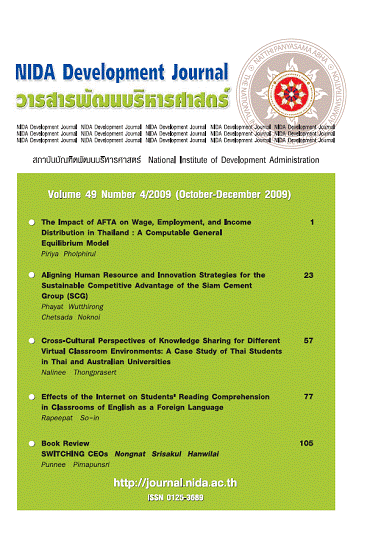Effects of the Internet on Students’ Reading Comprehension in Classrooms of English as a Foreign Language
Keywords:
Internet, Reading, ComprehensionAbstract
The purpose of this study was to investigate the effects of the Internet as a supplementary resource on the students’ reading comprehension. Three hypotheses were tested to see if the posttest mean scores of the experimental group experiencing the Internet-based reading as a supplementary resource were significantly higher than those of the control group experiencing the book-based reading as a supplementary resource, if the posttest mean scores of the student rating themselves as having a high computer knowledge were significantly higher than those rating themselves as having a low computer knowledge, and if a positive relationship between the students’ final grades in an English reading course and their posttest mean scores on the reading section of the Chulalongkorn University’s Test of General English Proficiency (CU-TEP) existed. Fifty-one non-English major students enrolled in an English reading course offered at Srinakharinwirot University participating in this study. Twenty-one students were randomly assigned into the experimental group and thirty students were in the control group and were in a semester treatment. The results revealed that the students in the Internet group did not outperform the students in the non-Internet group on the test, and no significant difference was found on the students having a high computer knowledge and those having a low computer knowledge. An analysis of correlation coefficient indicated that there was a positive relationship between the students’ final grades in the English reading course and their posttest mean scores on the reading section of the CU-TEP.
การวิจัยครั้งนี้มีจุดมุ่งหมายเพื่อศึกษาผลของอินเตอร์เนตต่อการอ่านของนิสิตที่ใช้ภาษาอังกฤษเป็นภาษาต่างประเทศ การวิจัยนี้ได้ดำเนินการขึ้นโดยอาศัยพื้นฐานของข้อสมมติฐาน 3 ข้อ คือ 1) ผลสัมฤทธิ์ด้านการอ่านของกลุ่มนิสิตที่เรียนการอ่านโดยอาศัยอินเตอร์เนตเป็นแหล่งความรู้เสริมมีประสิทธิภาพมากกว่าผลสัมฤทธิ์ด้านการอ่านของกลุ่มนิสิตที่เรียนการอ่านโดยไม่อาศัยอินเตอร์เนตเป็นแหล่งความรู้เสริม 2) ผลสัมฤทธิ์ด้านการอ่านของกลุ่มนิสิตที่มีความสามารถด้านคอมพิวเตอร์สูงกว่ามีมากกว่าผลสัมฤทธิ์ด้านการอ่านของกลุ่มนักสิตที่มีความสามารถด้านคอมพิวเตอร์ต่ำกว่า 3) มีความสัมพันธ์เกิดขึ้นระหว่างระดับคะแนนของนิสิตที่เรียนวิชาการอ่านภาษาอังกฤษ กับ ผลสัมฤทธิ์ด้านการอ่านจากแบบทดสอบศักยภาพทางวิชาการด้านภาษาอังกฤษแห่งจุฬาลงกรณ์มหาวิทยาลัย
ผู้วิจัยได้คัดเลือกนิสิตที่ไม่ได้เรียนวิชาอังกฤษเป็นวิชาเอกจำนวน 51 คนเป็นกลุ่มทดลองในงานวิจัยครั้งนี้ โดยแบ่งกลุ่มนิสิตออกเป็นเป็น2 กลุ่มทดลองได้แก่ กลุ่มนิสิตที่ได้รับการเสริมการอ่านจากอินเตอร์เนตซึ่งเป็นกลุ่มทดลองและ กลุ่มนิสิตที่ได้รับการเสริมการอ่านจากหนังสือเพียงอย่างเดียวซึ่งเป็นกลุ่มควบคุม นิสิตทั้งสองกลุ่มทดลองใช้เวลาเรียนการอ่าน 1 ภาคการศึกษา โดยใช้แบบทดสอบวัดผลสัมฤทธิ์ศักยภาพด้านการอ่านภาษาอังกฤษแห่งจุฬาลงกรณ์มหาวิทยาลัยทั้งก่อนและหลังการเรียนของนิสิต
ผลการทดลองพบว่า
1. ผลสัมฤทธิ์ทางการเรียนระหว่างกลุ่มนิสิตที่ได้รับการเสริมการอ่านจากอินเตอร์เนตและกลุ่มนิสิตที่ไม่ได้รับการเสริมการอ่านจากอินเตอร์เนตไม่แตกต่างกันอย่างมีนัยสำคัญทางสถิติ
2. ผลสัมฤทธิ์ด้านการอ่านระหว่างกลุ่มนิสิตที่มีความสามารถด้านคอมพิวเตอร์สูงกว่าและกลุ่มนิสิตที่มีความสามารถด้านคอมพิวเตอร์ต่ำกว่าไม่แตกต่างกันอย่างมีนัยสำคัญทางสถิติ
3. มีความสัมพันธ์ระหว่างระดับคะแนนของนิสิตที่เรียนวิชา เทคนิคการอ่าน กับ ผลสัมฤทธิ์ด้านการอ่านจากแบบทดสอบศักยภาพทางวิชาการด้านภาษาอังกฤษแห่งจุฬาลงกรณ์มหาวิทยาลัย





